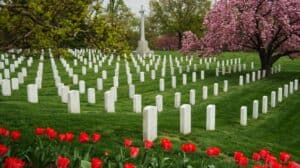
Memorial Day is the perfect time to remember family history research.
Memorial Day is a federal holiday celebrated each year on the final Monday of May. Formerly known as Decoration Day, it was established after the U.S. Civil War on May 5, 1868, to remember the men and women who died while serving in the armed forces. Decoration Day referred to the practice of laying or decorating flowers on graves to remember the fallen soldiers of the Civil War and as a sign of healing. The name Memorial Day was first used in 1888, and after World War, I was extended to honor all Americans who died while in military service.
Many people visit cemeteries and memorials to remember friends and family members on Memorial Day. They place flowers on graves and take a moment to ponder memories, share heartfelt feelings, and bow in reverence to those laid to rest.
Table of Contents
ToggleMemorial Day Is A Time of Renewing Relationships Past and Present
As individuals come to the cemetery to pay their respects, sometimes having traveled hundreds of miles, Memorial Day can take on the character of a Family reunion. Often people meet by chance as they have come to the cemetery and renew relationships and share the memories of those who have brought them together by chance on a spring day.
Many communities have parades. Volunteers place American flags on the graves of soldiers. Sunrise military services are held at the cemetery with a flag briskly hoisted. Churches hold special services. And Family members gather for potluck dinners. Those are but a few of the many things that happen during Memorial Day weekend.
Discovering the Story of You
We all have many questions about those who have gone before us. The steps of the journey toward learning more about our progenitors are guided by the questions we ask. With each answer comes another question. A sense of connection and a bond that spans generations begins in time. Each Ancestor contributed in some way to your very existence.
This journey will lead researchers to discover, uncover and recover the one-of-a-kind story of the ancestral lines whose path leads directly to their own. An Ancestors’ path is forged by time, choices and life experiences that begin in the home and expand into the lands where they lived. It’s about the people known, the places visited, the decisions made, the opportunities lost or gained, and the spiritual, physical and mental vitality and folly.
Family members learn of important events such as birth, marriage and death. An Ancestor’s story is influenced by culture, religion, political endeavors, education and social and economic status. Those delving into the lives of those who have gone before them gain a front-row seat to the historical events surrounding members of a Family, from war and migration to famine and struggles for civil rights.
Do not underestimate the value of an Ancestors’ story or the story you are currently living. Every story is important and unique, if for no other reason than that these people lived.
My journey as a Genealogist has not been easy. I wanted to quit countless times. Yet there was always a gentle and loving force that seemed to encourage — if not compel — me to find my ancestral lines. With experience and focused persistence, the journey became more accessible, increasingly prosperous, and more rewarding. I’ve learned how to do the following:
- Ask the right questions to be led to answers.
- Find, access and explore genealogical resources quickly.
- Develop, expand and sharpen my Genealogy research skills.
- Recognize clues and use them to trace and explore my Family ties.
- Resolve genealogical “brick walls.”
- Effectively use technology in research and preservation.
- Learn to find and use specific country, state and county records.
- Help others with their genealogy research.
A Genealogy Journey Begins
Before I say any more, I’d like to share a personal experience about how I began my journey as a Genealogist.
I became a Genealogist on Aug. 3, 1998. That was the day my mother died. Three events in the ensuing six weeks inspired me to begin a life focused on Family history, sharing knowledge, and helping others.
Mom died from a horrific lymph node cancer. I had gathered with my brother and sister to discuss with my mother her desires for what we all thought would be several months of life and to help her put her affairs in order. She entered the hospital on the first day of my arrival and died three days later.
Her passing was one of the more spiritual yet ugly experiences of my life. I was unfortunate to see Mom go but grateful that her suffering was over. While at her side, I saw the manifestation of God’s intervention and love for one of his children. Away from the bedside, it was contention at every turn with my sister. She knew everything about what Mom wanted and needed, yet the only opinion and decisions that mattered to her were her own. Even as we sought to help, Mom wrote her last will, all that could be heard was, “That’s mine.” It became an argument over things. As far as I was concerned, things were not necessary; I had all I needed and wanted. I just wanted there to be peace and an amenable resolution to helping Mom.
Experience 1: Preserve the Record
Following Mom’s passing and funeral, my brother, sister, and I met in Mom’s front room for one last time. My sister’s parting words were direct and expected, “You are welcome to stay the night. Whatever is left when you leave is mine.” My sister pointed to a pile of things in the middle of the floor and instructed my brother and me that we could take what we wanted, and whatever was left would be given to the thrift store. And then she left to go back to her home.
As soon as she left, my brother and I knelt in prayer and gave thanks to our Heavenly Father for our mother and asked for a blessing that relationships with our sister would heal in time. Upon conclusion of the prayer, there was a sense of serenity, and we were both emotionally and physically drained.
Where do you begin? I was standing in my mom’s home, and it was just things.
Mom had been a waitress at the Las Vegas Horseshoe Club for more than 40 years. She raised three children by herself, and I always loved coming home to be with her. Now here I was, standing in the middle of her front room, feeling lost and needing direction regarding where to begin.
And in almost that very moment, there was clarity. My mind filled with two thoughts: First, that this would be the last night that I would ever stand in this home; and, second, that I needed to preserve the record — gather photos, certificates, letters and other related documents that would tell the history of my mother.
I knew I needed to follow the direction I was receiving. My next thought was, “Where should I begin?” Within seconds, the thought came. I was first led to look in a cupboard in the kitchen where Mom kept coloring books, and I couldn’t see anything. As I began to close the door, I felt the need to look again. In the back was a bank pouch with unused check registers. I pulled it down, and inside was an envelope with pictures from Mom’s early childhood. I was next guided to a drawer in the kitchen where I found, in a plastic bag, essential photos of Mom’s life.
Next, I went to a spare bedroom dresser. As I went through the drawers, I found them all empty except for a larger drawer that Mom had filled with paperback books she had read. I pulled out half the books, became frustrated, and put the books back in the drawer, thinking there was nothing there. As I stood to leave, the thought came to look again, and I returned to the drawer again and removed all the books. At the bottom of the drawer was a sack filled with Mom’s essential papers, such as her birth certificate, marriage license, photographs and other documents.
Throughout the night, I went from room to room, having the same experience of knowing where to look in each room. My brother and I worked and packed until just before dawn. I privately asked for the last time, “Where else should I look?” The answer was a total sense of peace, and we were done.
As the morning progressed, I became grateful that I had heeded the promptings of the night before, as my sister made it clear that my brother and I were no longer welcome in what was now her home and that we would never receive any of mom’s pictures or records.
Experience 2: ‘Tell the Children About Me
Three weeks to the day after Mom’s passing, I had a dream where I heard a knock at the front door. When I opened the door, I saw my mother, and she asked me to take a walk with her. We came to an outdoor cafe, where we sat down and ordered a soft drink. During the conversation, Mom reached out and held my hand and said, “Barry, will you please tell the children about me?”
I replied, “Of course, Mother, I will do that.” At that very moment, I awoke, and I woke my wife and told her of the experience. We both found the dream somewhat odd since during my mother’s life, whenever she was asked to tell us more about her life, she would usually respond with, “It was hard; that’s all you need to know.”
I pondered the dream until it was time to rise to get ready for work, trying to understand what I had experienced. I had no answer, so I discarded the experience as an exciting dream with little or no meaning.
Experience 3: ‘Tell the children about me — now.’
Three more weeks passed. The same dream I’d had three weeks earlier began to unfold exactly as it had played out before. However, this time, when I was asked, “Barry, will you please tell the children about me?” I responded with irritation, “Mother, I told you I would.”
Mom responded emphatically, “Tell the children about me — now.”
This time, I awoke immediately. My mind began to fill with names and instructions that I should talk to and record my interview with each person. I turned on the computer and began typing the five names as they appeared. At that point, I thought, “Well, if I am going to talk to these people, I should also talk to…,” and I began to brainstorm other names. Then my mind went blank, and I felt the empty feeling I had ever experienced.
I immediately erased what I had added to the list and then knelt in prayer. After about 20 minutes of prayer, the first five names reappeared in my mind, followed by five new names. When I was through, I had five people I knew and five that I didn’t. My instructions were to contact each person and conduct oral histories regarding their relationship with my mother.
In the year that followed, I met with and recorded oral histories of each of the ten individuals. Each of them revealed a unique chapter of my mother’s life that spanned the 65 years she had lived. In addition to the oral history, I received memorabilia representing their relationship, such as cards, letters, photographs, documents, etc.
Oh, how I wish I had come to know the mother they described when she was still alive, and I had come to know her now through the eyes and experiences of her friends and family. It was the first step in what would become a connection to the generations before me.
The Meaning of ‘Tell the Children About Me’
In the beginning, interviewing Mom’s friends and Family was the limit of my intended participation in fulfilling the solemn promise I had given my mother in my dream. Genealogy and Family history were not in my vocabulary. Whenever I heard the words, I would usually find a good reason to leave the room.
Since Aug. 3, 1998, I have had countless experiences that have forged my path as a Genealogist. From conducting oral histories to searching the lands of my Ancestors, I have become the keeper of the record. It is much more than searching for names and connecting one generation to the next, and it realizes that I am the total sum of all those who came before. I am a chapter being written in a legacy to which I will humbly add my name.
As the keeper of the record, I seek to fulfill my role by carefully using the time I have available to record, manage, organize, extend and expand my Family tree. I had understood what Mother meant when she asked me to “tell the children” about her. It’s simply that she and those who have tasted the end of mortality live on. The Family tree is a living bond that extends beyond mortality. And no one in that link shall be forgotten.
Other Articles You May Enjoy
- How to Get Lost in the Wilderness and Find New Direction
- The Meaning of the Dream Changed My Life as A Storyteller
- A Story: Memorial Day Is the Perfect Time to Remember Family History
- A Story: Trimming the Christmas Tree Changes A Lonely Heart
- A Story: How to Start New Traditions When Old Ones Pass Away
- Find A Genealogy Story to Inspire Your Genealogy Journey
- Complete Guide for Conducting Oral History Interviews
- How to Use Sensory Details and Emotions in A Story
- Complete Guide to Writing A Personal Narrative
- 7,500-plus Questions About Life to Ask People When Writing Narratives
- 5 Questions People Ask About Writing A Personal Narrative
- 7 Step Color-coded File Organizing System for Writing Narratives
- 12 Easy Steps to Start Writing Your Memoir
- 9 Steps to Writing Your Personal Narrative
- How to Write a Memoir: Examples and a Step-by-Step Guide






